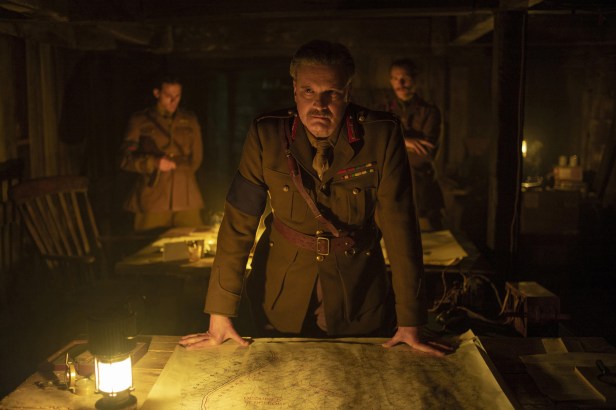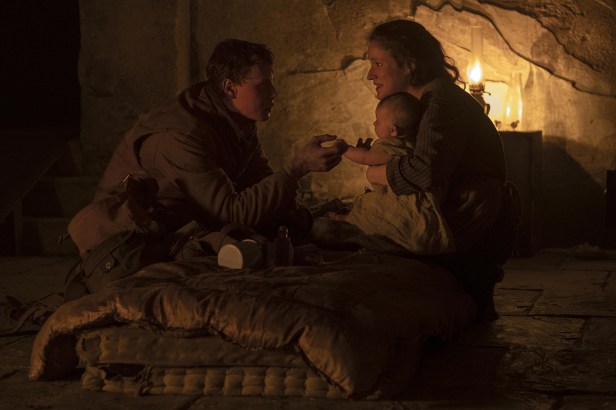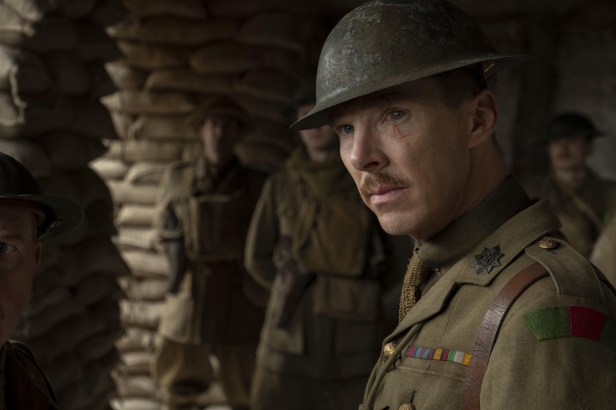1917 (2019)
Time is the enemy.
Two young British privates during the First World War are given an impossible mission: deliver a message deep in enemy territory that will stop 1,600 men, and one of the soldier’s brothers, from walking straight into a deadly trap.
1917, by director Sam Mendes, Spectre (2015), is an extraordinary, brutal phantasmagorical race against time through the labyrinthine landscapes of trench warfare. Far more than the sum of its immense technical achievements, the film recreates with exacting period detail the futility of battle and the harrowing cost on the human beings caught in the gruesome rat’s maze of the War to End All Wars.
Just a warning, this review is filled with spoilers. So, if you want to go into the film knowing nothing, my review is the paragraph above. Proceed with caution if you read on. Caveat emptor applies from right now.
April 6th, 1917. Two young soldiers, Lance Corporal Schofield (George MacKay) and his brother-in-arms Lance Corporal Blake (Dean-Charles Chapman) are tasked by Sergeant Sanders (Daniel Mays) to meet with General Erinmore (Colin Firth) to deliver an urgent message across enemy lines, which will potentially save the lives of almost two thousand fellow soldiers. Included in that number is Blake’s own brother Lieutenant Blake (Richard Madden), who is marching towards the Hindenburg line with no idea that the German retreat is a ruse to encourage the English to go over the top and face wholesale slaughter.

The First World War was an exercise in senselessness and terror. Men and women were pitted against each other along lines of nationality, class, race, and all other imaginable intersections. Essentially a squabble over territory waged between three cousins — Kaiser Wilhelm II, Tsar Nicholas II, and King George V — the war was also the first in which human beings were set against weapons created through post-industrial mechanization. Millions died from bombardment and gas attacks, but just as many lost their lives from sepsis, footrot, and disease that would easily have been cured if adequate medical aid was available. No matter how many field hospitals were set up, there was no way to cope with the sheer numbers of casualties being ferried in by often equally wounded and shocked soldiers.
Lieutenant Leslie (Andrew Scott) consecrates the two young soldiers with alcohol and asks them to send back any ammunition they have if they make it even a few steps. Black humor is all that keeps Leslie going because he’s aware that he will most likely be dead in a matter of days. The scene is played for laughs because Scott’s most famous role is now ‘Hot Priest’ from Phoebe Waller-Bridge’s Fleabag (2019), yet he also makes the audience feel sympathy for all young cannon fodder being propelled bodily at an enemy they only comprehend through the rhetoric of Empire.
As Schofield and Blake trudge through the mud, past the bodies of men blasted into grotesque friezes resembling paintings by Munch, they encounter the rotting corpses of not only man but beast. Horses are swarmed by flies eliciting abject repulsion and immense anxiety in both the characters and the audience, and still, we all bravely go on.

After the death of Blake (a moment that happens because the young men are trying to be humane with their enemy), Schofield encounters Captain Smith (Mark Strong), who attempts to get the young man further down the line. Corpulent generals berate the inferior ranks for not getting overstuffed trucks through mud and debris. Weary young men try to make jokes about how truly fucked they all are. A Sikh Private, Sepoy (Nabhaan Rizwan), ignores inherent racism to try to be one of the lads. Lines like ‘Home by Christmas,’ and ‘Chin up young chap!’ seem like hackneyed dialogue until one realizes this is the lie the men were fed continuously.
Captain Smith warns Schofield that ‘Some men just want the battle;’ the men who do want the battle tend to be faceless authority figures. Those that don’t are the myriad of men dying, shell-shocked, mutilated, and torn asunder by the machinery of warfare. Mendes and Oscar-winning cinematographer Roger Deakins, Blade Runner 2049 (2017), through the technique of the extended one-take, use the camera to show us the faces of those who’ve fallen in grotesque detail.
Scofield meets a terrified young woman, Lauri (Claire Duburcq), in the embattled French town of Écoust. The German occupation has left her caring for an orphaned infant girl. Lauri and Scofield communicate in a mixture of broken English and French, with him reassuring her that he will not hurt her or the baby, but to her, he is a man with a gun — uniforms have long since lost their meaning to her; Allied or German, all men are a threat. Although tonally the scene runs to melodrama, scriptwriter Mendes and co-writer Krysty Wilson-Cairns, Penny Dreadful (2014-16) cleverly weave in the Edward Lear nonsense poem ‘The Jumblies’ that Schofield recites to the infant. It’s a tender and exquisitely melancholic moment that resounds in profound humanity. The three form a small family momentarily, sheltering from the maelstrom around them.

Schofield fights in shadows and firelight. Écoust is a ruin of fire and crumbling buildings. Every movement the soldier makes is one that could end his life. He strangles a young German soldier in desperation and regret. The comparatively short run through the town has him face snipers from every direction. Deakins’ camera tracks around him. The audience identifies that there is no safe space, no place to hide. Only by continually running can he possibly survive, which leads him to a literal precipice where he has to make the choice to throw himself into the water and brave the brutal elements or die if he stops. The current pulls him through a river littered by bloated bodies. Some are Allied soldiers, some are German troops, but all are barely recognizable as once being human. Schofield appears tempted just to let go and let the river take him as his broken and bruised body seems unable to resist the pull of the water, and the peace that going under may give him. The blossoms of spring orchards fill the air creating a visual dichotomy that echoes Schofield’s emotional condition. Death is a state of savage grace that could easily take him. He drags himself from the river gasping and crushed; his cries of anguish and fear break down the myth that a man can mentally or physically survive unrelenting trauma.
Schofield collapses against a tree and finds the bone-weary 2nd Devons singing the traditional song ‘Wayfaring Stranger.’ Like a hymn in a verdant forest setting with church-like majesty, the tune is a prayer in its intensity. As the young soldiers march unknowingly towards their deaths, he runs again to find Colonel Mackenzie (Benedict Cumberbatch). Pushing his way past men poised to go over the top and straight into the German trap, the urgency of his mission keeps the audience on tenterhooks as he travels through the sea of dead, dying, or soon to be slaughtered.
As Schofield hands Lieutenant Blake the precious last reminders of his brother Sam — his tags and his rings — the shared trauma and grief that passes between the men is heartbreaking. So much loss is expressed through their collective fortitude and reserve.

The relationship between Schofield and Blake is central to understanding how far beyond the limits of any human’s endurance a young soldier is pushed. Schofield can barely speak of his fear and loss. He has traded his medal for bravery for basic necessities because, in the end, it’s a piece of tin that won’t keep him alive. Blake can’t understand why Schofield wouldn’t be proud to wear something honoring the sacrifices made to save another man. Blake wants people at home to know he wasn’t a coward. In one of the most powerful scenes of the film, the only thing that calms the terrified dying Blake is Schofield’s promises, that he will tell his brother that he did indeed die a hero.
The power of 1917 lies in its ability to tell a human story of a single mission and translate that into an account that encompasses the brutality of trench warfare. The film remains true in almost documentary-like detail to the landscape of the Western Front. Although, at times, 1917 veers into melodrama, and it takes a lot to willingly suspend disbelief that Schofield could have survived the barrage of bullets and explosions to complete his mission, the strength of the film is that it is so engrossing that most viewers will forgive some of the more outlandish escapes and near-misses.
Mendes and cinematographer extraordinaire Roger Deakins explore the war by using techniques that belong to multiple genres, most notably horror and melodrama. By employing a relatively seamless single-shot format, the camera becomes just as much a character as the actors. Although there are points where the audience will notice the edits, it doesn’t distract from the propulsive nature of the narrative. There is a lot to take in by virtue of how much happens in 118 minutes. As Schofield and Blake inch their way through claustrophobic spaces populated by screaming and mutilated bodies, they are blessed and cursed in equal measure by men who no longer hold out any hope for survival.

George MacKay, Captain Fantastic (2016), as Schofield is exceptionally powerful. Because of the way the film has been shot, he is required to express an immense range of emotions in what boils down to single takes. MacKay is an emerging actor who is set to become a dominant box office draw. Also accomplished is Dean-Charles Chapman, Blinded by the Light (2019), as Sam Blake, truly a lamb to the slaughter. He is the stand-in for so many young men who were cut down before they had seen anything of life. One of the great tragedies of the film is that it is his kindness and innocence that leads directly to his death. A lot of big names appear in the credits, but the film is carried by the two main actors with a cast of hundreds that the camera passes in the relentless race to save the Devons.
Deakins and Mendes’ regular production designer Dennis Gassner are the marvels of the production. Without Deakins’ immersive cinematography and Gassner’s exacting recreation of the Western Front, the film could have swerved into a faceless war story. Together with editor Lee Smith, Dunkirk (2017), constructing a compelling vision of hell on earth, Mendes pulls together a winning combination of visual elements that effectively hide some of the flaws in the storytelling. It will be greatly surprising if Deakins isn’t bestowed yet another slew of awards for his work on the film.
1917 is a muscular film that, even in its weaker moments, still outranks many modern cinematic renderings of warfare. For a major blockbuster production, it is probably the finest film about trench warfare that this reviewer can recall. It is some of the best work Mendes has produced. I heartily recommend the movie as a deep dive into a period of twentieth-century history that shaped modern Europe, Australia (ANZACs), and also to an extent, the USA. Lest we forget — with 1917, we hopefully will not.
4 / 5 – Recommended
Reviewed by Nadine Whitney
1917 is released through Universal Pictures Australia